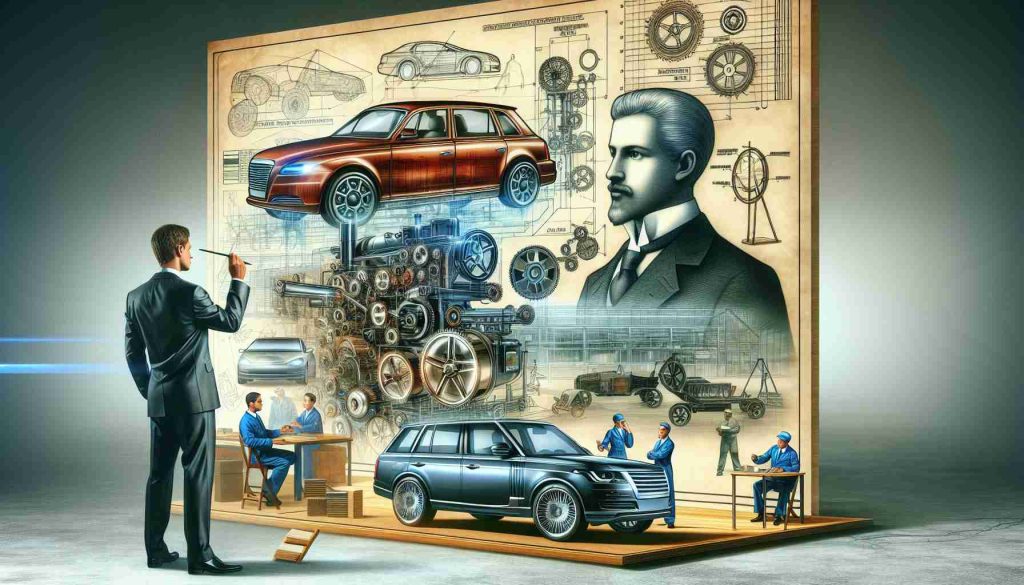Trump Shakes Up the Auto Industry! Major Changes Ahead
5 min read
In a dramatic shift affecting the automotive landscape, shares of Detroit’s established automakers surged while electric vehicle (EV) companies saw declines. This reaction came as President Trump’s administration announced plans that directly challenge the electric vehicle initiatives set by his predecessor.
In his inaugural address, Trump committed to dismantling the existing electric vehicle mandates, claiming this would protect American auto workers and preserve the freedom to choose traditional vehicles. He followed this with an executive order aimed at rolling back environmental regulations, including the elimination of state emissions rules that promote the transition away from gasoline-powered cars.
Additionally, funding linked to Biden’s Inflation Reduction Act, which allocated over $82 billion for EV-related projects, has come under scrutiny. The order may halt financial support for clean energy initiatives, threatening the growth of multiple jobs within the sector.
The impact on the stock market was immediate. Rivian, a key player in the electric truck market, saw its stock plunging over 6%, while Lucid and Tesla faced notable declines as well. Experts observed that the potential removal of the $7,500 tax credit for EV buyers could dampen sales further, complicating the outlook for companies reliant on electric vehicle sales.
Conversely, traditional automakers like Ford and General Motors experienced stock gains, buoyed by recent financial upgrades and the continued strength of their gasoline and hybrid vehicle lines. Analysts noted that, despite uncertainties related to Trump’s presidency, there remains potential for unexpected positive developments in the automotive sector.
The Broader Implications of the Automotive Shift
The recent fluctuations in stock prices among American automakers highlight a pivotal moment not just for the automotive industry, but for broader societal and economic landscapes. As traditional automakers regain momentum, bolstered by the rollback of environmental regulations, we may witness a significant cultural shift back towards conventional vehicle ownership, potentially stifling the embrace of cleaner technologies.
This reversion could profoundly affect global economic dynamics, especially as other nations continue to invest heavily in EV technology. Countries like China and Germany are leading the charge in renewable energy vehicle production, and any stagnation in U.S. EV development could widen the competitive gap. The shift not only endangers American jobs in clean tech but also threatens to undermine the country’s position as a leader in sustainable innovation.
Interestingly, the potential dismantling of federal EV support brings to light environmental repercussions. Without robust incentives for EV adoption, the progress toward greener transportation—as part of international efforts to combat climate change—could be severely hampered. The promise of cleaner urban environments and reduced carbon emissions hangs in the balance as political winds shift.
As trends continue to evolve, a decisive pivot toward traditional vehicles may augment reliance on fossil fuels while obstructing advancements in sustainable technologies. Long-term significance lies not just in immediate market reactions but in the sweeping implications for consumer behavior, environmental health, and global economic competitiveness.
The Future of the Automotive Industry: Traditional vs. Electric Vehicles in the Wake of Policy Shifts
Recent Developments in the Automotive Landscape
The automotive industry is undergoing significant changes, largely influenced by shifts in government policies and the fluctuating stock market. As traditional automakers like Ford and General Motors see a surge in their stock prices, electric vehicle (EV) manufacturers face difficulties, raising critical questions about the future of both segments in the market.
Key Factors Influencing Stock Market Trends
1. Government Policies: The recent announcements from President Trump focused on dismantling electric vehicle mandates and eliminating certain environmental regulations. This policy shift aims to protect American auto workers while advocating for more traditional gasoline-powered vehicles. The implications of such changes could have long-term effects on the EV market.
2. Market Reaction: In the aftermath of the policy announcements, EV companies such as Rivian, Lucid, and Tesla witnessed stock price declines. In contrast, established automakers benefitted from positive investor sentiment, which reflected a favorable outlook on gasoline and hybrid models under the current administration.
The Impact of Funding Cuts on Electric Vehicle Growth
The scrutiny surrounding funding linked to initiatives like Biden’s Inflation Reduction Act raises concerns about the future of clean energy investments. The Act originally aimed to allocate over $82 billion for EV projects and related infrastructure. Eliminating or reducing this funding could stall job creation and technological advancements within the EV sector.
Consumer Incentives and Their Implications
One critical aspect of EV sales is the federal tax credit, which currently stands at $7,500 for eligible EV buyers. Experts believe that the review and potential removal of this incentive could lead to decreased sales, further complicating the already uncertain trajectory for electric vehicle manufacturers. Consumers might revert to more affordable traditional cars, influencing the overall market dynamics.
Innovations and Trends in the Automotive Sector
Despite the current climate of uncertainty, analysts suggest that both traditional automakers and EV companies can still benefit from ongoing innovations:
– Hybrid Vehicles: Traditional automakers are investing in hybrid technology, which combines gasoline engines with electric propulsion, appealing to a broader consumer base looking for fuel efficiency without completely transitioning away from gasoline.
– Sustainability Initiatives: There is a growing trend towards sustainability within the automotive sector, with potential innovations focusing on reducing emissions and implementing greener production processes.
– Technological Developments: Advances in battery technology and manufacturing processes continue to evolve, which could diminish the cost of EV production and enhance vehicle performance, making them more attractive to consumers.
Use Cases and Market Insights
The automotive market is diverse, and the emergence of new consumer preferences presents both challenges and opportunities:
– Urban Mobility: As cities grow, electric vehicles are becoming a viable option for urban commuting, especially with the development of EV infrastructure like charging stations.
– Telematics and Connectivity: The rise of connected vehicles prioritizes consumer experience, ensuring that traditional auto brands remain competitive through technology that enhances driving safety and convenience.
Conclusion: The Road Ahead
The automotive landscape is on the brink of transformation, influenced by policies, consumer preferences, and technological advancements. Traditional automakers are experiencing a resurgence in stock performance, while EV manufacturers must adapt to a potentially tightened market. How these shifts unfold will significantly shape the industry in the coming years.
For more information on the automotive sector and its developments, visit AutoTrader.



